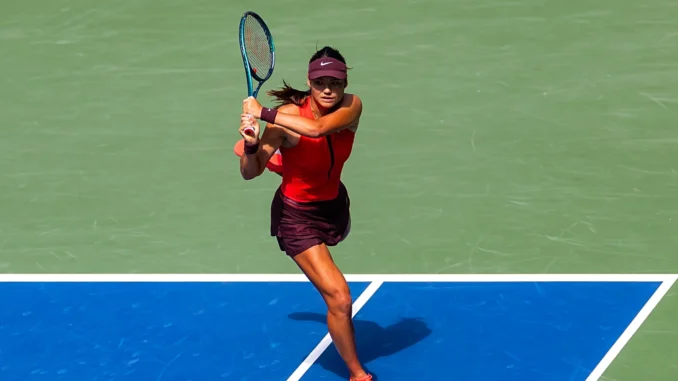
Emma Raducanu’s decision to withdraw from the 2025 Billie Jean King Cup Finals sent shockwaves through British tennis, igniting a firestorm of debate about loyalty, priorities, and the sport’s grueling schedule. The 22-year-old British No. 1, ranked No. 34 globally, opted out of representing Great Britain in Shenzhen, China, from September 16-21, choosing instead to compete in the WTA 500 Korea Open in Seoul, where she received a wildcard entry. This move, seen by some as a snub to national duty, drew sharp criticism from the Lawn Tennis Association (LTA) and fans, but found a staunch defender in her former coach, Mark Petchey, who called the tournament’s scheduling “zero sense” and backed Raducanu’s focus on her individual career.
Raducanu’s withdrawal was a blow to Great Britain’s hopes in the Billie Jean King Cup, where they face Japan in a quarter-final clash on September 18. Last year, Raducanu was a linchpin in the team’s semi-final run in Malaga, winning all three of her singles matches against formidable opponents like Germany’s Jule Niemeier, Canada’s Rebecca Marino, and Slovakia’s Viktoria Hruncakova. Her absence this year, following a similar decision to skip the April qualifiers for a training block with Petchey in Los Angeles, has raised questions about her long-term commitment to the team event. The LTA expressed their frustration succinctly: “Of course we are disappointed. However, we believe we have a great team and we’re looking forward to competing in Shenzhen.” Captain Anne Keothavong, left to regroup, named world No. 89 Francesca Jones as Raducanu’s replacement, alongside Katie Boulter, Sonay Kartal, and Jodie Burrage, with the option to add one more player.
Petchey, who coached Raducanu earlier in 2025 before parting ways due to his broadcasting commitments, leapt to her defense in a candid interview. He argued that the congested tennis calendar, which pits the Billie Jean King Cup against the lucrative Asian swing, left Raducanu with little choice. “There’s always two sides to everything,” Petchey said. “It’s very easy to come down on the side that you should want to represent your country. To be fair to Emma, when you look back at what she achieved on the clay against France, she proved that when she’s put up against it, she can A, produce the goods and B, does want to play. I don’t think you can blame Emma for a schedule that makes zero sense.” His remarks highlight the broader tension in tennis, where team events like the Billie Jean King Cup struggle for relevance against individual WTA tournaments offering crucial ranking points.
Raducanu’s decision was strategic, driven by her ambition to secure a seeding for the 2026 Australian Open. Having reached the quarter-finals in Seoul last year and the semi-finals in 2022—both times retiring mid-match due to injuries—she has points to defend and a chance to climb from her current No. 34 ranking. A top-32 spot would shield her from early clashes with elite players, a critical factor after her 6-1, 6-2 thrashing by Elena Rybakina in the 2025 US Open second round. Her new coach, Francisco Roig, formerly Rafael Nadal’s mentor, has been pivotal in her recent progress, including a semi-final run in Washington and competitive matches against top players like Aryna Sabalenka. Petchey endorsed this focus, saying, “For me, when I was with her and before Francisco took over the reins full time, it was a 50-50 call. If you’re asking me personally, from a purely selfish point of view of wanting to be in the best position for Australia, I would tell her not to play.”
The Korea Open, starting September 15, offers Raducanu a platform to build momentum and refine her game under Roig’s guidance. With top players like Iga Swiatek and Amanda Anisimova in the draw, it’s a high-stakes opportunity to prove her mettle. Meanwhile, Britain’s Billie Jean King Cup squad faces a tough challenge against Japan, led by Naomi Osaka, who recently reached the Canadian Open final and US Open semi-finals. Raducanu’s absence, while controversial, reflects a broader trend—players like Osaka, Madison Keys, and Qinwen Zheng also withdrew from the Finals, underscoring the event’s struggle to compete with the WTA Tour’s demands.
As Raducanu prepares for Seoul, Petchey’s support underscores her calculated gamble. “From a PR point of view, you know that people are going to take it badly. But a tennis player’s career is short. She’s suddenly on an upward curve,” he said. Her focus on individual success, backed by Roig’s expertise, signals a player prioritizing long-term growth over short-term national glory. Whether this choice pays off will unfold in the coming months, but one thing is certain: Raducanu’s journey, fraught with scrutiny and expectation, remains as compelling as ever.
Leave a Reply